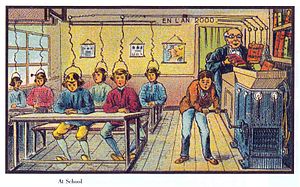Just passing on a very good post. Thank you Purpose Fairy.
One of the things I love about my work is the opportunity to collaborate with some wonderful people. In a phone call last week one of them commented on some significant changes she had noticed in my work. “The gloves are off” is how she described the change. “How did you do that?”
The short answer? I stopped caring. While parents, kids and families matter more now than ever, I quit bothering myself about things that other people tell me I should care about. Instead of obsessing about “traffic” and “reach” and “influence” and “metrics,” I’m back to being me: sharing good content as often as I can, trusting that it will reach someone who will benefit from it… when they need to connect with it.
It’s not that I don’t need or want feedback. I like to learn… but it was getting in the way.
So how did I learn to stop caring? The way I learn best: the hard way.
I worried and fretted. I checked and measured… and drove myself half insane. Then, as it sometimes does, life added some stresses of its own. For the privacy of those involved I will say only that some people I care deeply about faced some very difficult circumstances. To make matters worse, there was nothing I could do to help.
What’s that got to do with parenting? Or the Four Foundations? Quite a lot, actually.
Tough times can make us bitter or make us better. If we pay attention, illness, injury and error can reconnect us to what matters most. It’s similar to what happens when we realize we can’t smooth all the bumps in the road our kids will travel: we decide to teach them to navigate the bumps. And with that learning comes a level of fearlessness that frees us to give our best efforts and “let go” of the results.
When we share this attitude with our kids they often become too busy “taking care of business” to hear the warnings from the people who want to tell them they’re doomed to fail!
Whenever I’m stuck in a communication that just isn’t working I eventually get back to a favorite expression: “What you do speaks so loudly I can’t hear what you’re saying.” I have often found that if I can’t make myself understood, there’s a good chance I’m doing something to contradict myself. Contradictions create a level of confusion that help the message get lost.
Lots of things can help parents to create a mixed message… they often result from habit or behaviors we’ve just never thought about. It can be something as simple as smiling when we’re angry: when body language doesn’t match the message listeners are left with a choice about which part of the message is real.
A classic example is the parent who lectures about “the evils of drug use” with a drink in hand. Or someone like me who knows the importance of exercise… but doesn’t always “walk the talk.”
I’m not saying that drinking is wrong…. or that parents who drink should not talk to their kids about responsible substance use. Or even that people who don’t exercise enough are not allowed to encourage others to be more active.
What I AM saying is that a little more attention to timing, context and example adds up to a powerful, irrefutable message.
There are so many situations in life where this little reminder comes in handy. I remember once hearing a wonderful speaker saying how much he disliked those bumper stickers that say “I’d Rather Be…” (sailing, golfing… you know the ones…).
I don’t care much about bumper stickers but his reasoning caught my attention. He said they were dishonest… that if people honestly preferred that activity they would make the necessary sacrifices and changes. It’s something I try to remember when I start to say I am “too busy” for people or activities that matter to me. I think of it when people tell me they “want to write a book but don’t have time.”
And kids have an incredible gift for noticing the mis-matches between what we say and what we do. And, like in any other situation, we can make excuses — or use their insights to become better. To put our feet where are priorities are.
I am always moved by this video that illustrates the power of our example.


